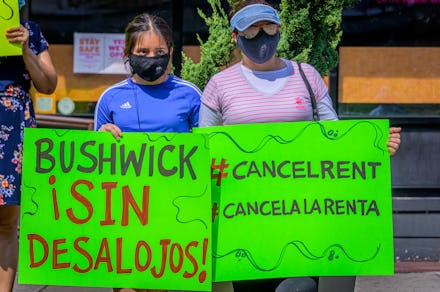New York will ban evictions for the next 2 months

On Sunday, President Trump signed a federal legislative package addressing the government-created impact of the coronavirus pandemic. Among its many line items is a continuation of the federal moratorium on evictions through January. And Monday, a special session of the New York state legislature followed suit, passing a moratorium on evictions for the next two months that Democratic Gov. Andrew Cuomo has already said he'll sign into law.
Democratic state Sen. Brian Kavanagh introduced the legislation, telling The Hill, "From the beginning of the COVID-19 pandemic we have understood that housing security must be an essential part of our effort to protect the health and wellbeing of all New Yorkers." But the effort isn't simply a result of legislative efforts in Albany, but rather by activists on the ground. For decades housing justice organizations built coalitions to beat back anti-housing policies, which came to a tipping point at the onset of coronavirus in New York City.
Per The Hill, Kavanagh's bill will "create a standardized form that residents facing financial hardships can fill out. Renters would submit the forms if they face income losses or increased costs specifically because of the pandemic." The legislation also includes protections for property owners, which had been a popular argument against rent and mortgage forgiveness.
"An eviction moratorium is important because it can bridge us to longer-term solutions," Judith Goldiner, head of the Legal Aid Society’s civil law reform unit, told The New York Times. "But it, in itself, is just short term. It doesn’t mean that the rent isn’t coming due."
Goldiner is right: Eviction moratoriums are not long-term solutions. In fact, they generally just push the financial burden of rent down the road, and advocates note that absent some fiscal magic, it's unlikely someone who doesn't have one month's rent on Jan. 1 will be able to pay several months' back-rent come June 1. As Jacobin wrote in May in response to a coordinated New York City rent strike, "Without canceling rent during this period, Cuomo is setting up the housing court system for total overload at the end of the moratorium period. As well, tenants will face crushing indebtedness."
We've already seen how a failure to enforce eviction moratoriums, repeals on eviction moratoriums, and judges who side with those doing the evicting results in more people living without shelter. As the number of people made homeless by the political response to coronavirus increases, so too do coronavirus case numbers. As Princeton University's Eviction Lab put it, an eviction moratorium foretells an eviction renewal, when "millions of renters will owe significant amounts of back rent." For an untold number of families, "displacement and eviction crisis will follow the public health crisis," the Eviction Lab wrote.
In the meantime, though, Kavanagh's bill may stave off imminent crisis for thousands of New Yorkers. Whether the government — New York's or America's — starts to acknowledge the long-term threat remains to be seen.